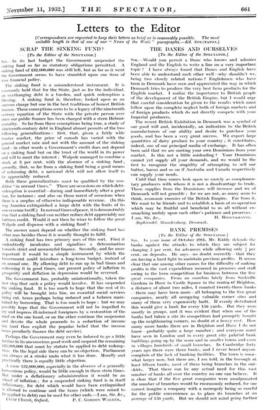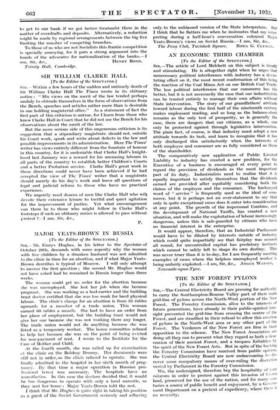BANK PREMISES
[To the Editor of the SPECTATOR.] Sin, - In your issue of October 20th, Mr. Kiddy defends the banks against the attacks to which they arc subject for charging 5 per cent. for advances while allowing only per
cent. on deposits. Ile says—no doubt correctly—that they arc having a hard fight to maintain previous profits. It seems clear that one among other causes for the difficulty of making profits is the vast expenditure incurred in premises and stuff owing to the keen competition for business between the five
great companies. From an omnibus lately from Sackville Gardens in Hove to Castle Square in the centre of Brighton, a distance of about two miles, I counted twenty-three banks --there may have been more—all belonging to the five great companies, nearly all occupying valuable corner sites and many of them very expensively built. If evenly distributed this would give a bank for every 150 yards. But they were mostly in groups, and it was evident that when one of the banks had taken a site its competitors had promptly bought up the neighbouring corners, no doubt at a heavy cost. 1-low many more banks there arc in Brighton and Hove I do not know—probably quite a large number ; and everyone must
have seen in London and in every great city palatial hank buildings going up by the score and in smaller towns and even
in villages hundreds of small branches. In Cambridge forty years ago there were three banks, and I never heard anyone complain of the lack of banking facilities. The town is some- what larger now, but there are, I am told, in the borough at least fifteen banks, most of them being branches in the out- skirts. That there can be any actual need for this vast number of banks all over the country no one can believe. It is clear that if the five great companies were amalgamated the number of branches would be enormously reduced, for one cannot imagine a company with a monopoly being so careful for the public convenience as to place its branches at an average of 150 yards, But -we should not mind going further
to get to our bank if we got better. treatrnintjliere in the matter of overdrafts and deposits. Alternatively, a reduction might be made by regional arrangements between the big five limiting the number of competing branches.
To those of us who are not Socialists this frantic competition is specially annoying, for it puts a strong argument into the, hands of the advocates for nationalization of the banks.—I































 Previous page
Previous page